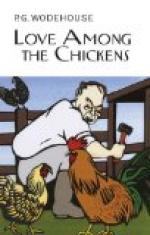“He greeted me with effusive shouts. Wouldn’t hear of my standing the racket. Insisted on being host. When we had finished, he fumbled in his pockets, looked pained and surprised, and drew me aside. ’Look here, Licky, old horse,’ he said, ’you know I never borrow money. It’s against my principles. But I must have a couple of bob. Can you, my dear good fellow, oblige me with a couple of bob till next Tuesday? I’ll tell you what I’ll do. (In a voice full of emotion). I’ll let you have this (producing a beastly little threepenny bit with a hole in it which he had probably picked up in the street) until I can pay you back. This is of more value to me than I can well express, Licky, my boy. A very, very dear friend gave it to me when we parted, years ago . . . It’s a wrench . . . Still,—no, no . . . You must take it, you must take it. Licky, old man, shake hands, old horse. Shake hands, my boy.’ He then tottered to the bar, deeply moved, and paid up out of the five shillings which he had made it as an after-thought. He asked after you, and said you were one of the noblest men on earth. I gave him your address, not being able to get out of it, but if I were you I should fly while there is yet time.”
It seemed to me that the advice was good and should be followed. I needed a change of air. London may have suited Doctor Johnson, but in the summer time it is not for the ordinary man. What I wanted, to enable me to give the public of my best (as the reviewer of a weekly paper, dealing with my last work, had expressed a polite hope that I would continue to do) was a little haven in the country somewhere.
I rang the bell.
“Sir?” said Mrs. Medley.
“I’m going away for a bit,” I said.
“Yes, sir.”
“I don’t know where. I’ll send you the address, so that you can forward letters.”
“Yes, sir.”
“And, if Mr. Ukridge calls again . . .”
At this point a thunderous knocking on the front door interrupted me. Something seemed to tell me who was at the end of that knocker. I heard Mrs. Medley’s footsteps pass along the hall. There was the click of the latch. A volume of sound rushed up the stairs.
“Is Mr. Garnet in? Where is he? Show me the old horse. Where is the man of wrath? Exhibit the son of Belial.”
There followed a violent crashing on the stairs, shaking the house.
“Garnet! Where are you, laddie? Garnet!! Garnet!!!!!”
Stanley Featherstonehaugh Ukridge was in my midst.
CHAPTER II
MR. AND MRS. S. F. UKRIDGE
I have often thought that Who’s Who, though a bulky and well-meaning volume, omits too many of England’s greatest men. It is not comprehensive enough. I am in it, nestling among the G’s:—
“Garnet, Jeremy, o.s. of late Henry Garnet, vicar of Much Middlefold, Salop; author. Publications: ‘The Outsider,’ ’The Manoeuvres of Arthur.’ Hobbies: Cricket, football, swimming, golf. Clubs: Arts.”




